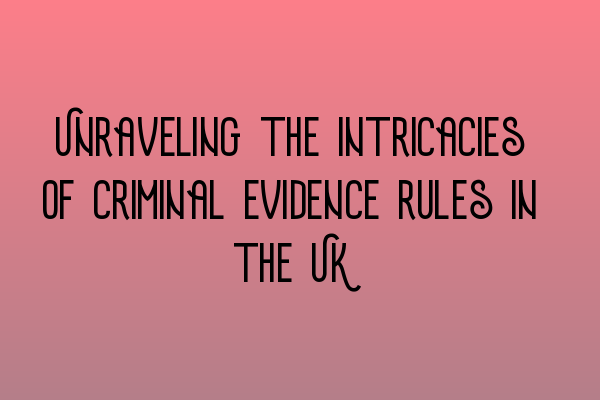Unraveling the Intricacies of Criminal Evidence Rules in the UK
As solicitors at SQE Criminal Law & Practice Law UK, we understand that navigating the complex world of criminal evidence rules can be a daunting task. The legal landscape is ever-evolving, making it essential for professionals to stay updated and well-versed in these rules.
In this blog post, we will provide you with comprehensive insights into the intricacies of criminal evidence rules in the UK. Whether you are a law student, legal professional, or someone with a general interest in criminal law, this article aims to equip you with valuable knowledge.
The Basics of Criminal Evidence
Before delving into the nitty-gritty details, let’s start with the basics. Criminal evidence refers to the information gathered during an investigation and presented in court to prove or disprove a crime. It plays a pivotal role in determining the guilt or innocence of an individual accused of a criminal offense.
Adhering to proper evidence rules is crucial to ensure fairness and justice in the legal system. The laws surrounding criminal evidence vary across jurisdictions, and in the UK, they are primarily governed by statutes, case law, and the common law.
Types of Criminal Evidence
There are various types of evidence that can be presented in court, each serving a specific purpose. These include:
- Direct Evidence: This is evidence that directly proves a fact without the need for any inference or presumption. It can include eyewitness testimony, video recordings, or confessions.
- Circumstantial Evidence: Unlike direct evidence, circumstantial evidence requires drawing inferences to establish facts. It consists of facts that, when considered together, lead to a logical conclusion.
- Expert Evidence: Expert witnesses, such as forensic scientists or medical professionals, may present their opinions or findings to assist in clarifying complex issues. Their expertise adds credibility and weight to the evidence presented.
Rules of Criminal Evidence
To ensure the admissibility and reliability of evidence in criminal cases, various rules and principles have been established. These rules aim to strike a balance between the interests of justice and protecting the rights of the accused.
Some essential rules in criminal evidence include:
- The Relevance Rule: Only evidence that is relevant to the case may be presented in court. It must have a logical connection to the facts in question and aid in deciding the ultimate issue.
- The Hearsay Rule: Hearsay, which is an out-of-court statement offered for the truth of the matter asserted, is generally inadmissible. There are exceptions to this rule, such as statements made by a person who is unavailable to testify.
- The Opinion Rule: Lay witnesses are generally not allowed to give their opinions on matters within their personal knowledge. However, expert witnesses may provide their professional opinions based on their specialized knowledge and expertise.
- The Character Rule: Evidence of a person’s character or reputation is generally inadmissible to prove their guilt or innocence. However, there are exceptions, such as when the accused’s character is an essential fact in the case or when it relates to witness credibility.
Challenges in Applying Criminal Evidence Rules
While these rules provide a framework for presenting and evaluating evidence, applying them can pose challenges. Determining relevance, assessing the credibility of witnesses, and addressing potential biases are just a few examples.
Additionally, new technologies and advancements in forensic science constantly raise questions about the admissibility and reliability of certain types of evidence. It becomes essential for legal professionals to stay informed and adapt to these evolving circumstances.
Conclusion
Understanding the intricacies of criminal evidence rules in the UK is vital for legal professionals and anyone interested in criminal law. By gaining a comprehensive knowledge of these rules, we can ensure fairness and uphold the principles of justice.
At SQE Criminal Law & Practice Law UK, we offer comprehensive SQE preparation courses to help aspiring solicitors excel in their careers. Check out our related articles for more information:
- SQE 1 Practice Exam Questions
- SQE 1 Practice Mocks FLK1 FLK2
- SQE 2 Preparation Courses
- SQE 1 Preparation Courses
- SRA SQE Exam Dates
